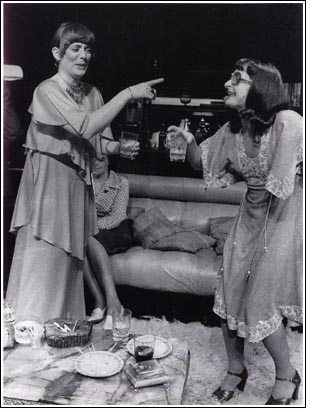Recency bias, but BETTER MAN may be one of the best films I saw in 2024. I cannot describe just how imaginative, kinetic, audacious and moving this film is. Admittedly, Robbie Williams was a big part of the pop-cultural backdrop of my teenage years and early 20s. But I would like to think that even if you had never heard of one of Britain's biggest selling music stars, you would still get a lot from this deeply raw, deeply humane, film.
Williams has been open about his life story, not least in a multi-part Netflix doc. He grew up in poverty in a former industrial town in England, with a father (Inside No. 9's Steve Pemberton - superb) who dreamt of stardom and abandoned Robbie and his mum when he was little. At 15, he was plucked from obscurity to be part of one of the biggest Boy Band's of all time, but on the strict instructions that he was just the clown and the backing dancer, rather than having any musical or creative credibility. By 19 he had left Take That and gone solo, with the self-imposed demons of trying to impress his absentee dad and trying to outcompete his old band and their newer rivals, Oasis. If Oasis sold out Knebworth, then Williams too had to sell out Knebworth.
The film is absolutely blunt about Williams' demons. He is an alcoholic and drug addict and faces demons of self-doubt and self-hatred. At many points we see Williams cutting cocaine with a razor and we later see suicidal ideation. The genius of Williams and writer-director Michael Gracey (THE GREATEST SHOWMAN) is to depict Williams as a CGI-chimp, overlaid on real vocal and physical performance from Jonno Davies. Through that avatar we see Williams as he sees himself - an outcast, a court jester, an animal. But we also see an incredible range of emotion - from fear to joy to hurt and anxiety. The eyes are so expressive and the child-hood version of the chimp is particularly winning. And when Robbie is facing his demons, they are avatars of himself as a chimp - in various guises and from different parts of his life. When he finally faces them down, and learns to forgive his dad in order to love himself, it's a moment of deep catharsis.
That Williams survives is down to his own hard work in rehab and his own honesty - but also the love of three women - his mum, his adoring grandma (Alison Steadman - superb as always) and for a period his fiancé his Nicole Appleton. This part of the story is hard to watch. Williams' addiction is in full-throttle and she is clearly in love with him. We also get the revelation that she was forced into an abortion by her manager as she was on the cusp of her own chart success.
And what of the construction of the film? Well, hear me out: this may well be the best movie musical of 2024, and yes that includes WICKED. The set-piece numbers are sensational. There's a bravura montage set to Williams' hit Rock DJ, filmed on Piccadilly and Regent Street, that takes us through Take That's rise to success. For those of who remember those outfits and haircuts and dance moves, it's a kinetic, technically brilliant piece of musical theatre. Later in the film there's an equally brilliantly staged montage that shows Williams going from a meet-cute with Appleton to getting engaged and mourning the abortion. The actress Raechelle Banno must be quite some dancer, as that dance scene set on a boat is phenomenal. The final musical number I would like to call out is to Williams' hit Angels. Here we have him on the verge of Knebworth but mourning the death of his grandma. This is when I started crying.
I cannot speak more highly of Williams' honesty and creativity and his partnership with Gracey. BETTER MAN is one of the most unique, compelling and affecting films I have seen all year. It's also one of the most honest and moving depiction of addiction and mental health crisis that I have seen on film EVER. I heartily recommend it to you.
BETTER MAN is rated R, has a running time of 134 minutes, and was released in the USA on Christmas Day and UK on Boxing Day.

